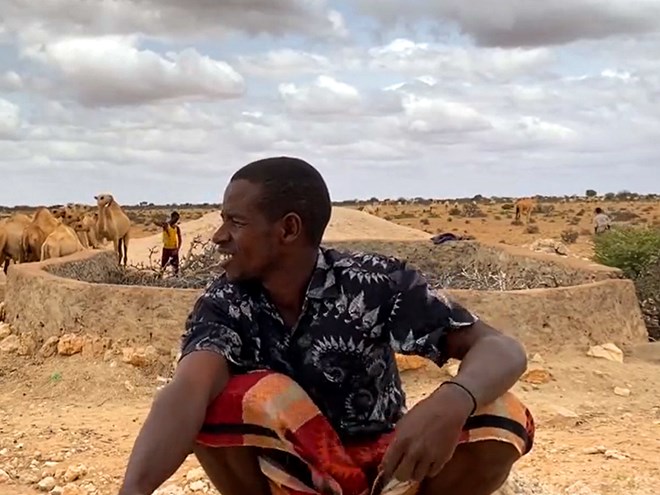
Tuesday August 3, 2021

(Video still: Anisa Hussein Dahir/ICRC)
Ahmed Mohamud, an elderly pastoralist from Mudug region in north-central Somalia, has witnessed the devastations climate change has wrought in his ancestral village where livestock keeping has strong economic and cultural value to his folks.
Mohamud belongs to a fading generation of Somali herders who have nostalgic memories of a bygone era when weather patterns were predictable, ensuring that fodder and water for their livestock were readily available.
The proud owner of a sizable herd of camels said that he was worried about the sustainability of pastoralism given the ravages of climate change in his backyard.
“I have lost 50 out of 70 camels in the recent past due to drought but some herders have lost all their livestock when the ground becomes too dry and there is no pasture or water,” said Mohamud.
He said that lush vegetation and pristine springs that used to dot large swathes of central Somalia back in the day are gradually fading thanks to prolonged dry spells linked to climate change.
“The droughts have become so frequent that we count ourselves lucky if one year lapses without experiencing the phenomenon. Our survival is always at stake when the dry season kicks off with high velocity,” said Mohamud.
Somalia and the greater Horn of African region have become epicenters of climate related disasters that have worsened hunger, water stress and resource-based conflicts.
According to the UN Office for the Coordination of Humanitarian Affairs (UNOCHA), more than 30 climate-related hazards including floods and droughts have hit Somalia since 1990, a three-fold increase compared to similar events between 1970 and 1990.
Compounding the challenge of climate change is the prolonged civil strife that has undermined the resilience of local communities who mainly eke a living from pastoralism and subsistence farming.
“Somalia is a perfect case of disastrous consequences of the combination of climate change and conflict. The duo have worsened an already dire humanitarian situation,” said Abdalla Togola, head of the International Committee of the Red Cross (ICRC) Economic Security Program in Somalia.
While noting that three decades of conflict have weakened institutions of governance in Somalia and left an estimated 2.9 million people internally displaced, Togola said that climatic stresses have also worsened competition for dwindling resources, leading to inter-communal tensions.
While saying extreme weather events have undermined reconstruction in Somalia, Togola believed massive investment in resilience programs is urgent to shield herders and smallholder farmers from negative impacts of climate change.
The ICRC has provided financial support to more than 11,000 families in Somalia in order to secure their livelihoods amid a lengthy dry spell this year, said Togola, who noted that travel restrictions aimed at curbing the spread of COVID-19 coronavirus have also worsened the humanitarian situation in Somalia amid dwindling supply of staple food and a slump in foreign exchange earnings.
As for Mohamed Hassan Gure, another elderly pastoralist, the loss of livestock to droughts has laid bare the growing vulnerability of his folks even as they try to forge a better future for the young generation.
Gure owns a sizable number of goats and securing them a place where they can forage green pasture has been a Herculean task due to frequency of droughts and fierce competition for the same resource with other herders.
“The animals died in large numbers because they did not have anything to eat during the latest dry season. Our way of life is in peril if we continue experiencing these droughts,” said Gure.
He said that herders are finding it hard to locate areas with green pasture and water for their livestock due to frequency of droughts, adding that desert locust infestation and COVID-19 have also devastated their livelihoods.
According to Gure, the allure of pastoralism is fading at a dizzying speed as extreme weather events become the norm in Somalia, leading to loss of camels, cattle and goats that are a source of income, food and cultural identity.
“We the rural people have always relied on livestock for sustenance and losing them at a high rate due to drought has pushed us further to the margins,” said Gure. “We worry about the future of our children as it is apparent that harsh weather conditions will be the norm.”